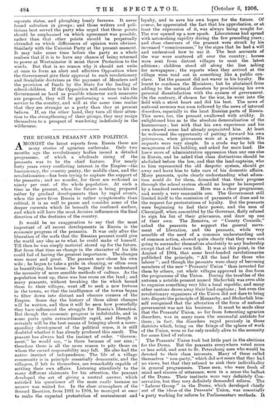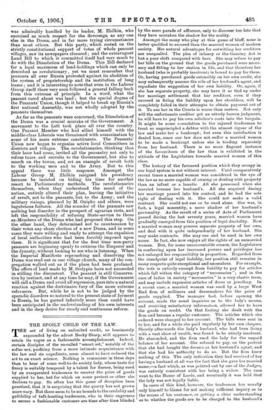THE RUSSIAN PEASANT AND POLITICS.
AMONGST the latest reports from Russia there are many stories of agrarian outbreaks. Only two months ago the revolutionary bodies issued a detailed programme, of which a Wholesale rising of the peasants was to be the chief feature. For nearly forty years every conflicting interest in the Empire—the bureaucracy, the country gentry, the middle class, and the revolutionaries—has been trying to capture the support of the peasants ; and no wonder, for these are reckoned as ninety per cent. of the whole population. At such a time as the present, when the future is being prepared rather by gradual developments than by rapid events, when the news from Russia is rather symptomatic than critical, it is as well to pause and consider some of the deeper currents which lie beneath the confused surface, and which will have the most decisive influence on the final direction of the destinies of the country.
It would be no exaggeration to say that the most important of all recent developments in Russia is the economic progress of the peasants. It was only after the liberation of the serfs that the Russian peasant could give the world any idea as to what he could make of himself. Till then lie was simply material stored up for the future. But from that time no change in the character of his life could fail of having the greatest importance. The changes were many and great. The peasant now chose his own wife ; he began to take a pride in cleaning, or often even in beautifying, his house ; he began dimly to understand the necessity of more sensible methods of culture. As the population went up, there was less room on the land ; and many peasants, without breaking the tie which bound them to their villages, went off to seek a new fortune in i he towns, so that the intelligence of the towns began to filter down into distant and obscure corners of the Empire. Some day the history of these silent changes will be written, and then it will be seen how powerfully they have influenced the struggle for Russia's liberation. But though the economic progress is indubitable, and in some parts quite extraordinarily rapid, and though it certainly will be the best means of bringing about a corre- sponding development of the political sense, it is still doubtful whether it has already produced this result. The peasant has always had the instinct of order. "Govern- ment," he would say, "is there because of our sins ;" therefore there is all the more reason to pity those on whom the sacred responsibility may fall. He also had the native instinct of independence. The life of a village community is in principle essentially democratic, and the villagers, if left to themselves, are remarkably capable of settling their own affairs. Listening attentively to the many different claimants for his attention, the peasant developed the art of giving a neutral answer, which satisfied his questioner all the more easily because no answer was waited for. In the close atmosphere of the Second Reaction, from 1881 to 1904, he managed at once to make the expected protestation of contentment and loyalty, and to save his own hopes for the future. Of course, he appreciated the fact that his approbation, or at least the expression of it, was always being sought for. The war opened up a. new epoch. Literateness had spread with astonishing rapidity during the few preceding years ; and close observers of the peasant were struck by his increased "consciousness," by the signs that he had a will and understood bow to use it. The best accounts of the war were scattered all over the country; horses were sent from distant villages to meet the, latest editions ; children stood all along the line asking for newspapers the reports when they arrived at the village were red out in something like a public con- clave. Yet the peasant did not waver in his loyalty. He learnt to condemn the Ministers ; but he abstained from adding to the natiotal disasters by proclaiming his own personal dissatisfaction with the system of government. On the contrary, if chosen for the war, he went into the field with a stout heart and did his best. The news of national reverses was soon followed by the news of internal disorders, especially in the least Russian parts of Russia. This news, too, the peasant swallowed with avidity. It enlightened him as to the absolute demoralisation of the bureaucracy ; but With that his own experience and his own shrewd sense had alreadysequainted him. At least he welcomed the opportunity of putting forward his own grievances, when grievances were at a premium. His requests were very simple. In a. crude way he felt the meagreness of his holding, and asked for more land. He knew more of administrative oppression than any one else in Russia, and be asked that class distinctions should be abolished before the law, and that the land-captains, who to him represented the old despotic system, should go away and leave him to take care of his domestic affairs. Many peasants, quite clearly understanding what educa- tion could do for them, demanded that their progress through the school system should no longer be hampered by it hundred restrictions. Here was a clear programme, and surely a very reasonable one. The Government still limited itself to the remission of payments of dues and to the request for protestations of loyalty. But the peasants were beginning to feel their power, and the men of Chernigoff, when assembled by the Governor, flatly refused to sign his list of their grievances, and drew up one of their own. The Zemstva, or "County Councils," asked the peasants to support the general move- ment of liberation, and the peasants, while very sensible of the need of a common understanding and of common action, showed quite clearly that they were not going to surrender themselves absolutely to any leadership except that of their own folk. It was at this point, in the August of 1904, that some level-headed revolutionaries published the principle, "All the land for those who labour " ; and though the peasants were chary of becoming members of the new "Peasants' Unien " thus invented for them by others, yet whole villages approved in due, form the programme of the Union. During the troubles of the autumn a notable peasant named Slicherbak was even able to organise something very like a local republic, and many other cantons drove away their land-captains; but even the revolutionary organisers Of the Union did not dare to bring into dispute the principle of Monarchy, and Shcherbik him- self recognised that the alteration of the form of national government was not his business. It must be made clear that the Peasants' Union, so far from fomenting agrarian disorders, was in many cases the successful antidote for them ; in fact, the disorders raged precisely in those districts which, being on the fringe of the sphere of work of the Union, were so far only crudely alive to the necessity for some kind of reform.
The Peasants' Union took but little part in the elections for the Puma. But the peasants everywhere voted more or less solid, and sent to St. Petersburg men who would be devoted to their class interests. Many of these called themselves "non-party," which did not main that they had no views, but that they refused to sink their individuality in general programmes. These men, who were fresh of mind and sincere of utterance, were in a sense the ballast of the Bum. Their instincts were very definitely Con- servative, but they very definitely demanded reform. The "Labour Group" in the Duma, which developed chiefly. out of the ideas of the Peasants' Union, was essentially a party working for reform by Parliamentary methods. It was admirtibly handled by its leader, M. Zhilkin, who exercised as much respect for the Sovereign as any one else in the Duma, and in far more trying circumstances than most others. But this party, which rested on the strictly constitutional support of votes of whole peasant villages, saw its newspapers closured ; and the extravagant Land Bill to which it committed itself had very much to do with the Dissolution of the Duma. This Bill declared for a legal maximum of land-holdings which can only be described as revolutionary, yet we must remember that peasants all over Russia protested against its abolition of the system of proprietorship and its institution of long leases ; and it is interesting to note that even in the Labour Group itself there very soon followed a general falling back from this extreme of principle. In a word, what the peasant cared about was laud ; but the special dogma of the Peasants' Union, though it helped to break up Russia's first national Assembly, was not wholly adopted by the peasants themselves.
As far as the peasants were concerned, the Dissolution of the Duma was a crucial mistake of the Government. A movement to the Left took place all over the country. One Peasant Member who had allied himself with the middle-class Liberals was threatened with assassination by some of his more extreme constituents. The Peasants' Union now began to organise active local Committees in districts and villages. The revolutionaries, thinking that their hour had come, invited all the peasantry not only to refuse taxes and recruits to the Government, but also to march on the towns, and set an example of revolt both to the working men and to the Army. But to this appeal there was little response. Amongst the Labour Group M. Zhilkin resigned his presidency because he insisted on biding his time for another resort to Parliamentary methods. The revolutionaries themselves, when they understood the mood of the nation, entirely altered their plan, leaving the initiative of revolt, not to the peasants, but to the Army ; and the military risings, planned by M. Onipko and others, were lugubrious failures. All the sounder of the peasants saw nothing but disorder in the prospect of agrarian riots, and left the responsibility of refusing State-service to those ex-Members of the Duma who had proposed this step. On the other band, they determined not to countenance by their votes any sham election of a new Duma, and in some cases they were willing and ready to attempt the expulsion of local authorities who had been forcibly imposed upon them. It is significant that for the first time non-party peasants are beginning openly to criticise the Emperor and the dynasty, without looking to see who is listening. When the Imperial Manifesto reproaching ana dissolving the Duma was read out in one village church, many of the con- gregation walked out as if the place had been profaned. The offers of land made by M. Stolypin have not succeeded in killing the discontent. The peasant is still Conserva- tive by instinct, and at any time he may, if the Government will call a Duma and avoid all repression, pass into a natural reaction against the doctrinaire fury of the more extreme reformers. But, while he is net to be judged by the sporadic disorders so natural to the present state of ferment in Russia, he has gained infinitely more than could have been anticipated in the understanding of his own interests and in the deep desire for steady and continuous reform.































































 Previous page
Previous page